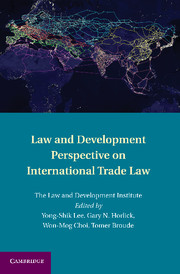Book contents
- Frontmatter
- Contents
- About the Editors and Authors
- Acknowledgments
- Law and development perspective on international trade law
- Introduction
- Part I Developing Countries and International Trade
- Part II Law and Development in the World Trade Organization
- Part III Law and Development in Free Trade Agreements
- Part IV Law and Development in Regional Initiatives
- 13 Islands of Prosperity and Poverty
- 14 Trade Preferences and Economic Growth
- 15 Economic Development of North Korea
- 16 Applying the “Specificity” Test in Countervailing Duty Cases in the Context of China's Foreign Investment Policies
- 17 Nonconclusions
- Epilogue
- Index
- References
13 - Islands of Prosperity and Poverty
A Rational Trade Development Policy for Economically Heterogeneous States
from Part IV - Law and Development in Regional Initiatives
Published online by Cambridge University Press: 05 August 2011
- Frontmatter
- Contents
- About the Editors and Authors
- Acknowledgments
- Law and development perspective on international trade law
- Introduction
- Part I Developing Countries and International Trade
- Part II Law and Development in the World Trade Organization
- Part III Law and Development in Free Trade Agreements
- Part IV Law and Development in Regional Initiatives
- 13 Islands of Prosperity and Poverty
- 14 Trade Preferences and Economic Growth
- 15 Economic Development of North Korea
- 16 Applying the “Specificity” Test in Countervailing Duty Cases in the Context of China's Foreign Investment Policies
- 17 Nonconclusions
- Epilogue
- Index
- References
Summary
Introduction
International law has typically operated at the state-to-state level, as opposed to a substate level. As such, it is states as a whole that are typically the subjects of international law. In contrast, individuals, corporations, and even substate political entities such as municipalities and provinces/states are typically not subjects of international law. Of course, in some fields within international law, such as human rights and international investment law, these substate entities are beginning to have greater rights and obligations as they begin to play a more active participatory role in international law. In international trade and development law, however, the rules and policies still largely operate at the traditional international law level – at the country or state level.
- Type
- Chapter
- Information
- Law and Development Perspective on International Trade Law , pp. 317 - 333Publisher: Cambridge University PressPrint publication year: 2011



